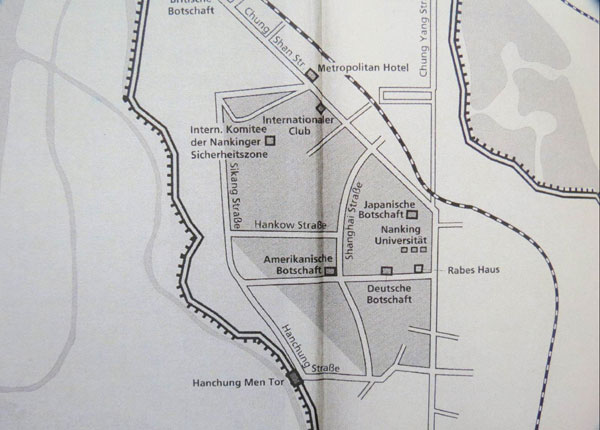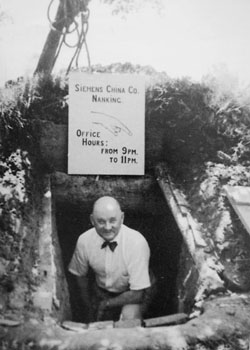 |
|
A map shows the 3.86-square-kilometer safety zone in the city which consisted of 25 locations. [Photo provided to China Daily] |
 |
|
German businessman John Rabe emerges from a bunker that was used as an air raid shelter in Nanjing. [Photo provided to China Daily] |
Rabe was the chairman of the International Committee. Because Germany was Japan's ally during World War II, his records of the massacre have immense credibility.
In his diaries, Rabe kept detailed notes about the brutality of the Japanese soldiers, his protests to senior Japanese military officials, and his letters to Adolf Hitler, in which he detailed the atrocities and asked for help.
"With Vautrin and Rabe's diaries, the evidence of the crimes committed by the Japanese army is irrefutable," Yang Shanyou said, adding that Rabe was a great man and very popular in China, but few people in Germany have heard of him, partly because he was a Nazi. However, Rabe was irreplaceable, Yang said.
Rabe's position as a Nazi gave him an advantage as chairman of the International Committee. Japanese soldiers would stop and back away when he pointed at the swastika he wore on his arm. None of the 622 refugees under his protection was hurt or killed.
"He loved China and the Chinese people, he expressed that clearly in his diaries. He lived in China for 30 years and it was his second home. He's the (Oskar) Schindler of China. Of course, he also worried about his own safety. He had diabetes and had to take insulin every day. He had the chance to leave Nanjing, but he asked himself in his diary what would happen to the people in the safety zone once he left," Yang said.
In 1937 and 1938, Western media, including Reuters, The Associated Press and the New York Times, published more than 40 reports about the massacre. From January to May 1938, Life magazine in the US published 10 photos of the wounded and the dead, but didn't reveal the name of the photographer.
